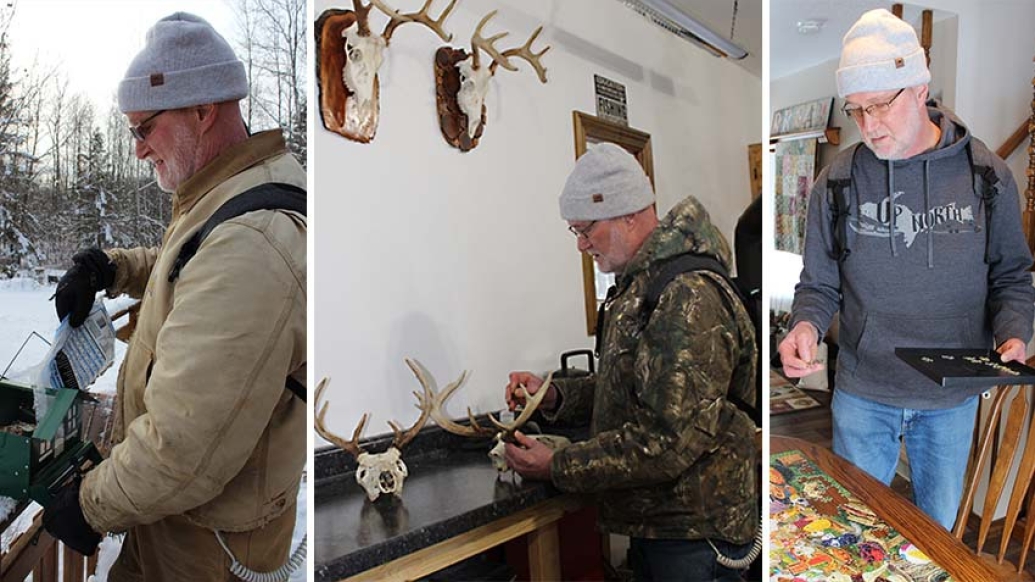A multidisciplinary clinic is using rehabilitation focused neuropsychology to help patients optimize life after oncology treatments
5:00 AM
Author |

Ken Kessler’s apparent depression and confusion were getting worse.
There were gaps in his memory. His ability to do basic daily tasks was deteriorating and he was having difficulty communicating when he tried to tell his wife, Carman Kessler, what was wrong.
Ken Kessler had been diagnosed with glioblastoma, a rare and aggressive brain tumor. In April 2022, he had his first procedure at the University of Michigan Rogel Cancer Center to remove as much of the tumor as possible.
But Ken Kessler’s symptoms weren’t going away, and the couple was becoming increasingly concerned that Ken Kessler would no longer be able to enjoy his hobbies.
Prior to the operation on his second tumor, Ken Kessler was introduced to the Functional Wellness Clinic, a multidisciplinary clinic focused on optimizing daily functioning and quality of life for patients with cancer at the University of Michigan Health.
The clinic includes providers in neurosurgery, neuro-oncology, neuro-radiology, speech language pathology, physiatry, and neuropsychology.
One of them is Nicolette Gabel, Ph.D., a neuropsychologist in the Department of Physical Medicine and Rehabilitation who treats disruptions in the brain due to disease or illness.
During an assessment to identify the areas of cognitive functioning affected by the tumors, Ken Kessler told Gabel he wanted to get back to doing the activities he loved to do, like archery.
“We can work with that,” Gabel said enthusiastically.
Setting new personal goals
Cancer treatment can have an intense impact on the entire person – physically, cognitively, and emotionally, which is why the Functional Wellness Clinic takes a holistic approach to cancer treatment recovery.
Patients typically enter the clinic after surgery and while engaged in ongoing cancer treatments. Each member of the clinic meets with the patient to learn about their personal goals for recovery and determine the best approach to their care as a team.
"Having physical medicine and rehabilitation providers in the room with oncology specialists is very impactful," said Gabel. "This is our way to work together to create a positive impact on our patients. As a team we focus on functioning and what’s most important to the patient."
When Ken Kessler came to the clinic for the first time, he had a list of goals he wanted to achieve. Before his tumor, he was an avid archer and had an interest in European style taxidermy, and he was determined to get back to these hobbies, in addition to improving his communication and memory.
With these targets in mind, Gabel worked to create a specialized routine for his recovery. She wanted to create a strategy that would allow Kessler to work on his cognitive functioning at home and optimize his daily life.
Ken Kessler's clinic treatment began with standardized tests that assessed his memory, visual skills, language, and how quickly he processed information. The exams revealed that Ken Kessler's visual memory was much stronger than his verbal memory and his physical capabilities were strong.
Using these results, a customized plan was put in place to help use Ken Kessler's visual memory to strengthen his verbal memory. Gabel suggested using pictures, graphics, and calendars to help him retain information at home. She also gave Ken Kessler and his wife recommendations to see an occupational therapist as well as a psychologist.
During his most recent clinic visit in December, Ken Kessler retook these standardized tests and showed substantial improvements in language and his ability to quickly process information.
Back to old hobbies
On average, the clinic tends to see patients up to a year after their procedures. As the patients complete their treatments and start to show stable progress, their return visits to the clinic become less frequent. This gives patients like Ken Kessler a chance to experience more independence using strategies at home to return to their daily lives as much as possible.
Between Ken Kessler’s home exercises, a reduction of swelling in his brain, and no tumor regrowth, he has made steady progress and resumed his favorite activities. He has been creating European style mount taxidermy for friends, caring for chickens, and going on daily walks. Ken Kessler decided to take a break from archery, but he’s able to pick it up again if he changes his mind.
"I feel more like my old self again," said Ken Kessler. "I have more freedom and can see the progress within myself."
Gabel and the Kesslers have also noticed progress in his cognitive abilities. His communication skills and memory skills have significantly improved between his last two visits.
“He has a much easier time talking and communicating with others,” said Carman Kessler. “We have also noticed improvements in him remembering events and regular daily information.”
Carman Kessler acts as his primary caregiver at home in Midland. She has been able to see Ken Kessler's progress firsthand and could not be more thankful for the clinic and the team of nurses that worked with him in the hospital.
"I wouldn't feel comfortable as a caregiver without the support we have received from the clinic," she said.

Explore a variety of health care news & stories by visiting the Health Lab home page for more articles.

Department of Communication at Michigan Medicine
Want top health & research news weekly? Sign up for Health Lab’s newsletters today!





